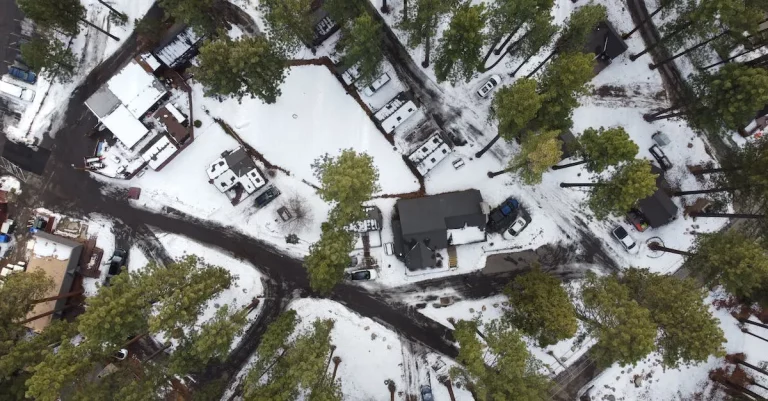Unregistered Vehicles On Private Property In California: What You Need To Know
If you have a classic car, project vehicle, or old RV taking up space in your backyard or garage in California, you may be wondering if you can legally keep it there without registering it. The rules around unregistered vehicles on private property in the Golden State can be confusing. In this comprehensive guide, we’ll provide a quick answer upfront and then dive into details on registration laws, penalties for violations, exempt vehicles, and storage requirements to ensure your unregistered vehicle avoids fines or impoundment.
If you’re short on time, here’s a quick overview: In most cases, vehicles parked on private property in California still need to be registered with the DMV if they are operable. There are some exemptions for inoperable collector’s vehicles.
California’s Vehicle Registration Laws
California has strict laws when it comes to vehicle registration. These laws are put in place to ensure that all vehicles on the road are properly registered and meet certain safety and environmental standards. Here are some key points to keep in mind:
All vehicles driven on public roads must be registered
According to the California Vehicle Code, all vehicles driven on public roads must be registered with the Department of Motor Vehicles (DMV). This includes cars, trucks, motorcycles, and even recreational vehicles.
Registering your vehicle not only ensures that it meets the necessary safety and emissions requirements, but it also provides proof of ownership and allows law enforcement to identify the vehicle in case of theft or other illegal activities.
If you are caught driving an unregistered vehicle on a public road, you may be subject to fines, penalties, and even having your vehicle impounded. It’s important to renew your registration on time and keep the necessary documents in your vehicle at all times to avoid any legal issues.
Parked unregistered vehicles must generally be inoperable
When it comes to unregistered vehicles parked on private property, the rules are slightly different. While it is not illegal to have an unregistered vehicle on your private property, it must generally be inoperable. This means that the vehicle should not be capable of being driven on public roads.
It should not have a valid license plate, registration sticker, or be in a condition that would allow it to be easily driven.
However, it’s important to note that local ordinances may vary, so it’s always a good idea to check with your local government or homeowners’ association to ensure you are in compliance with any specific regulations in your area.
Registration provides tax revenue for road maintenance
One of the main reasons for vehicle registration is to provide tax revenue for road maintenance and improvements. When you register your vehicle, you are required to pay registration fees and taxes, which go towards the upkeep of California’s roads and highways.
These funds are used for repairs, maintenance, and other transportation-related projects.
By registering your vehicle, you are contributing to the overall safety and functionality of the state’s road infrastructure. It’s important to keep your registration up to date to ensure that your contribution is being used effectively to benefit all drivers in California.
For more information on California’s vehicle registration laws, you can visit the official website of the California Department of Motor Vehicles.
Penalties for an Unregistered Vehicle on Private Property
If you own a vehicle in California, it is important to ensure that it is properly registered. This not only applies to vehicles driven on public roads, but also to vehicles parked on private property. Failure to register your vehicle can result in serious penalties and consequences.
Fines up to $1,000 plus delinquent registration fees
One of the penalties for having an unregistered vehicle on private property in California is the potential for hefty fines. If your vehicle is found to be unregistered, you may be subject to fines of up to $1,000.
In addition to the fine, you will also be required to pay the delinquent registration fees for the period during which the vehicle was unregistered. These fees can add up quickly, making it financially burdensome to neglect registering your vehicle.
Possible impoundment of the unregistered vehicle
In some cases, if your vehicle is found to be unregistered on private property, it may be subject to impoundment. This means that your vehicle could be towed and held in an impound lot until you provide proof of registration.
The cost of towing and storage fees can be quite expensive, adding to the overall financial impact of failing to register your vehicle.
Criminal charges if fraudulently registered out-of-state
Another important consideration when it comes to unregistered vehicles on private property is the potential for criminal charges if you fraudulently register your vehicle out-of-state. Some individuals may attempt to register their vehicle in a different state to avoid California’s registration requirements.
However, if you are caught doing so, you could face criminal charges, including fines and potential jail time. It is essential to follow the proper registration process and comply with all applicable laws to avoid these serious consequences.
Exemptions for Unregistered Vehicles
When it comes to unregistered vehicles in California, there are certain exemptions that you need to be aware of. These exemptions allow certain vehicles to remain unregistered under specific circumstances. Let’s take a closer look at some of these exemptions:
Inoperable collector’s vehicles may be exempt
If you own a collector’s vehicle that is inoperable and kept on private property, you may be exempt from registering it. California law recognizes that collector’s vehicles are often restored or preserved as part of our state’s rich automotive history.
Therefore, if your vehicle is not operational and is solely being kept as a collector’s item, you may not need to register it. However, it’s important to note that this exemption only applies if the vehicle is not driven on public roads.
Farm equipment like tractors may not require registration
Another exemption for unregistered vehicles in California applies to farm equipment such as tractors. Since these vehicles are primarily used for agricultural purposes on private property, they may not require registration.
However, if the farm equipment is operated on public roads, it must be registered and comply with all applicable laws and regulations. So, if you’re a farmer using your tractor exclusively on your own land, you can breathe a sigh of relief knowing that registration may not be necessary.
Newly purchased vehicles have 20 days before registration
When you purchase a new vehicle in California, you have a grace period of 20 days before you need to register it. This means that you have three weeks to gather all the necessary paperwork and complete the registration process.
During this time, you can legally drive the vehicle without it being registered. However, it’s important to note that you must have a valid temporary operating permit or a dealer’s report of sale displayed on the vehicle during this period.
It’s important to understand these exemptions for unregistered vehicles in California to ensure you are in compliance with the law. Remember, if your vehicle doesn’t fall under one of these exemptions, it must be registered to avoid any fines or penalties.
For more information and specific details, you can visit the California Department of Motor Vehicles website.
Properly Storing an Unregistered Vehicle
Inoperable vehicles must have engine parts removed
When storing an unregistered vehicle on private property in California, it is important to ensure that inoperable vehicles have their engine parts removed. This is to prevent any potential hazards and to comply with state regulations.
By removing engine parts, such as the battery, spark plugs, or fuel lines, you can significantly reduce the risk of accidental fires or leaks.
Use a cover to indicate the vehicle is stored long-term
Using a cover for your unregistered vehicle can serve as a visual indicator that the vehicle is stored long-term and not in use. This can help prevent any confusion or concerns from neighbors or local authorities.
Additionally, a cover can protect the vehicle from dust, debris, and the elements, prolonging its overall condition during storage.
Do not park unregistered vehicles on public streets
It is important to note that parking unregistered vehicles on public streets in California is illegal. Unregistered vehicles must be stored on private property, such as a garage or driveway. Parking an unregistered vehicle on a public street can result in fines or even the vehicle being towed.
For more information on California vehicle storage regulations, you can visit the official California Department of Motor Vehicles website: https://www.dmv.ca.gov/.
Conclusion
While California generally requires registration for vehicles parked on private property, there are some exceptions for inoperable collector’s cars and other specialty vehicles. With proper long-term storage methods and an understanding of the applicable laws, you can likely keep your unregistered vehicle safely on private property and avoid fines. As always, check with the DMV about your specific situation before making any assumptions.








